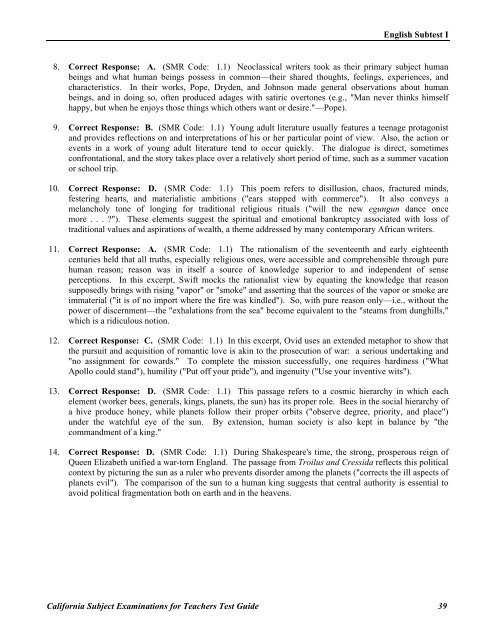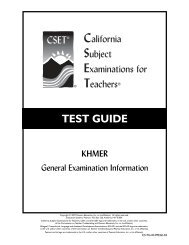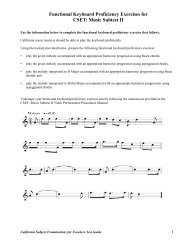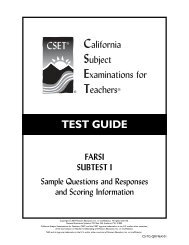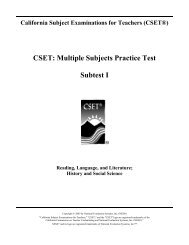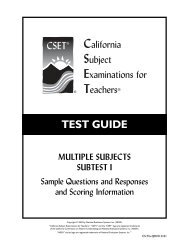TEST GUIDE ENGLISH SUBTEST I - CSETs
TEST GUIDE ENGLISH SUBTEST I - CSETs
TEST GUIDE ENGLISH SUBTEST I - CSETs
Create successful ePaper yourself
Turn your PDF publications into a flip-book with our unique Google optimized e-Paper software.
English Subtest I<br />
8. Correct Response: A. (SMR Code: 1.1) Neoclassical writers took as their primary subject human<br />
beings and what human beings possess in common—their shared thoughts, feelings, experiences, and<br />
characteristics. In their works, Pope, Dryden, and Johnson made general observations about human<br />
beings, and in doing so, often produced adages with satiric overtones (e.g., "Man never thinks himself<br />
happy, but when he enjoys those things which others want or desire."—Pope).<br />
9. Correct Response: B. (SMR Code: 1.1) Young adult literature usually features a teenage protagonist<br />
and provides reflections on and interpretations of his or her particular point of view. Also, the action or<br />
events in a work of young adult literature tend to occur quickly. The dialogue is direct, sometimes<br />
confrontational, and the story takes place over a relatively short period of time, such as a summer vacation<br />
or school trip.<br />
10. Correct Response: D. (SMR Code: 1.1) This poem refers to disillusion, chaos, fractured minds,<br />
festering hearts, and materialistic ambitions ("ears stopped with commerce"). It also conveys a<br />
melancholy tone of longing for traditional religious rituals ("will the new egungun dance once<br />
more . . . ?"). These elements suggest the spiritual and emotional bankruptcy associated with loss of<br />
traditional values and aspirations of wealth, a theme addressed by many contemporary African writers.<br />
11. Correct Response: A. (SMR Code: 1.1) The rationalism of the seventeenth and early eighteenth<br />
centuries held that all truths, especially religious ones, were accessible and comprehensible through pure<br />
human reason; reason was in itself a source of knowledge superior to and independent of sense<br />
perceptions. In this excerpt, Swift mocks the rationalist view by equating the knowledge that reason<br />
supposedly brings with rising "vapor" or "smoke" and asserting that the sources of the vapor or smoke are<br />
immaterial ("it is of no import where the fire was kindled"). So, with pure reason only—i.e., without the<br />
power of discernment—the "exhalations from the sea" become equivalent to the "steams from dunghills,"<br />
which is a ridiculous notion.<br />
12. Correct Response: C. (SMR Code: 1.1) In this excerpt, Ovid uses an extended metaphor to show that<br />
the pursuit and acquisition of romantic love is akin to the prosecution of war: a serious undertaking and<br />
"no assignment for cowards." To complete the mission successfully, one requires hardiness ("What<br />
Apollo could stand"), humility ("Put off your pride"), and ingenuity ("Use your inventive wits").<br />
13. Correct Response: D. (SMR Code: 1.1) This passage refers to a cosmic hierarchy in which each<br />
element (worker bees, generals, kings, planets, the sun) has its proper role. Bees in the social hierarchy of<br />
a hive produce honey, while planets follow their proper orbits ("observe degree, priority, and place")<br />
under the watchful eye of the sun. By extension, human society is also kept in balance by "the<br />
commandment of a king."<br />
14. Correct Response: D. (SMR Code: 1.1) During Shakespeare's time, the strong, prosperous reign of<br />
Queen Elizabeth unified a war-torn England. The passage from Troilus and Cressida reflects this political<br />
context by picturing the sun as a ruler who prevents disorder among the planets ("corrects the ill aspects of<br />
planets evil"). The comparison of the sun to a human king suggests that central authority is essential to<br />
avoid political fragmentation both on earth and in the heavens.<br />
California Subject Examinations for Teachers Test Guide 39


